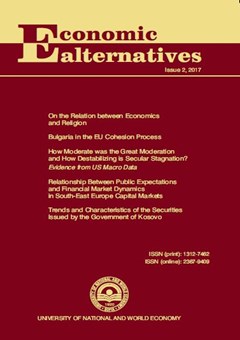Relationship Between Public Expectations and Financial Market Dynamics in South- East Europe Capital Markets
Author: Ani Stoitsova-Stoykova
Abstract
We examine the market efficiency, information asymmetry and the linkages between financial market dynamics and public expectations of the stock markets of South East Europe (SEE). Therefore, this study aims to answer the question of whether there is a difference between the stock market performance of the developed and emerging SEE stock exchanges. This paper employs GARCH models and uses the daily and monthly returns of eleven stock market indices of South East Europe (SEE) - Bulgaria, Banja Luka, Sarajevo, Croatia, Greece, Serbia, Slovenia, Turkey, Romania, Montenegro and Macedonia over the period from January 2005 to November 2015. The results reveal that SEE capital markets except Montenegro are not efficient in the context of the efficient market hypothesis (EMH). Moreover, the consumer sentiment information and inflation expectations affect the financial market dynamics of SEE stock indices. The analysis shows that there is no linkage between industrial expectations and the dynamics of the SEE capital markets. Test results potentially present that the consumer and inflation expectations have predictive power for the performance of SEE capital markets.

